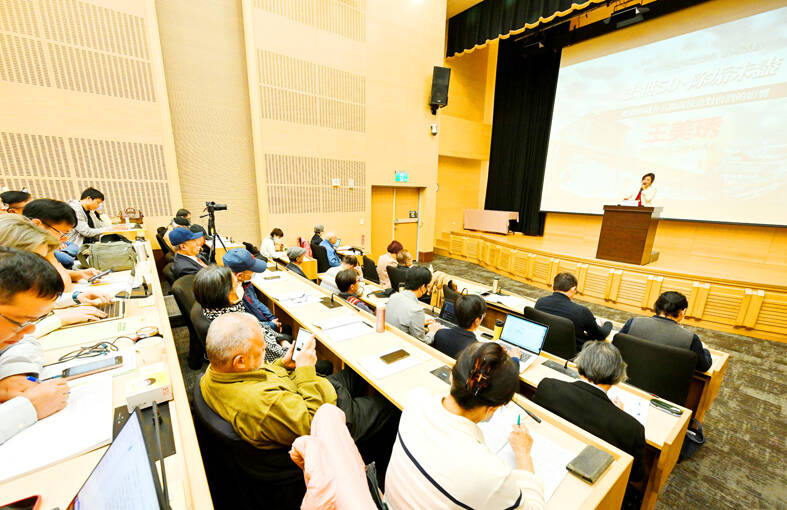Chiang Kai-shek (蔣介石) did irreparable damage to Taiwan by enacting martial law to impose autocratic rule and military control during the post-war era, as well as by leaving the UN, which severed Taiwan’s ties to the rest of the world, historians and human rights advocates said at an academic conference in Taipei yesterday.
It has been 50 years since Chiang of the Chinese Nationalist Party (KMT) died in 1975, Koo Kwang-ming Foundation executive director Michelle Wang (王美琇) said, adding: “Now we must examine and take account of his authoritarian rule, that many democracy activists and dissidents lost their lives during Chiang’s bloody White Terror regime.”
“We did not properly deal with our history or pass down memories of the White Terror to the younger generations,” she said. “It has led to the current political turmoil in the legislature, with the KMT legislative members — the inheritors and followers of Chiang — being so brazen as to use democratic means to trample and dismantle democracy.”

Photo: Tien Yu-hua, Taipei Times
Fu Jen Catholic University law professor Lin Cheng-yu (林政佑) said that the KMT with Chiang at the helm placed the Republic of China under military control for many decades until the lifting of martial law in 1987, adding that Chiang used the military apparatus, state security forces and intelligence agencies to impose pervasive surveillance over the whole of society.
“Chiang must be held accountable for such abuses, and the people should demand justice for his flouting of the regular justice system, trying activists and dissidents in the military courts,” he said.
Other historians said that cases in the military courts usually proceeded swiftly and lacked time for thorough investigation, leading to convictions based on insufficient grounds and circumstantial evidence.
Some defendants were tortured into giving a confession, while Chiang himself interfered in the process, turning imprisonment into death sentences in many cases.
Law professor Wu Hao-jen (吳豪人) said that Chiang did huge damage by cutting Taiwan’s links to the world when he left the UN following the admission of the People’s Republic of China, as several key nations advised him to remain as a representative of Taiwan instead.
“It is only much, much later on, after Taiwan’s democratization, that we could link up again with international agreements on human rights and freedom,” Wu said.

Taiwan’s Liu Ming-i, right, who also goes by the name Ray Liu, poses with a Chinese Taipei flag after winning the gold medal in the men’s physique 170cm competition at the International Fitness and Bodybuilding Federation Asian Championship in Ajman, United Arab Emirates, yesterday.

Costa Rica sent a group of intelligence officials to Taiwan for a short-term training program, the first time the Central American country has done so since the countries ended official diplomatic relations in 2007, a Costa Rican media outlet reported last week. Five officials from the Costa Rican Directorate of Intelligence and Security last month spent 23 days in Taipei undergoing a series of training sessions focused on national security, La Nacion reported on Friday, quoting unnamed sources. The Costa Rican government has not confirmed the report. The Chinese embassy in Costa Rica protested the news, saying in a statement issued the same

A year-long renovation of Taipei’s Bangka Park (艋舺公園) began yesterday, as city workers fenced off the site and cleared out belongings left by homeless residents who had been living there. Despite protests from displaced residents, a city official defended the government’s relocation efforts, saying transitional housing has been offered. The renovation of the park in Taipei’s Wanhua District (萬華), near Longshan Temple (龍山寺), began at 9am yesterday, as about 20 homeless people packed their belongings and left after being asked to move by city personnel. Among them was a 90-year-old woman surnamed Wang (王), who last week said that she had no plans

TO BE APPEALED: The environment ministry said coal reduction goals had to be reached within two months, which was against the principle of legitimate expectation The Taipei High Administrative Court on Thursday ruled in favor of the Taichung Environmental Protection Bureau in its administrative litigation against the Ministry of Environment for the rescission of a NT$18 million fine (US$609,570) imposed by the bureau on the Taichung Power Plant in 2019 for alleged excess coal power generation. The bureau in November 2019 revised what it said was a “slip of the pen” in the text of the operating permit granted to the plant — which is run by Taiwan Power Co (Taipower) — in October 2017. The permit originally read: “reduce coal use by 40 percent from Jan.